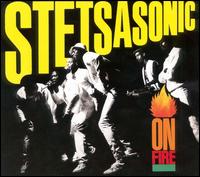| On Fire | ||||
|---|---|---|---|---|
 | ||||
| Studio album by | ||||
| Released | October 15, 1986 | |||
| Genre | Golden age hip hop | |||
| Label | ||||
| Producer | Stetsasonic | |||
| Stetsasonic chronology | ||||
| ||||
| Singles from "Lyte as a Rock" | ||||
| ||||
| Review scores | |
|---|---|
| Source | Rating |
| AllMusic | |
| The Encyclopedia of Popular Music | |
| The Rolling Stone Album Guide | |
On Fire is the debut album by the American hip hop band Stetsasonic. [4] [5] It was released in 1986 via Tommy Boy Records. [6] It was released on compact disc for the first time in 2001, with three bonus tracks.